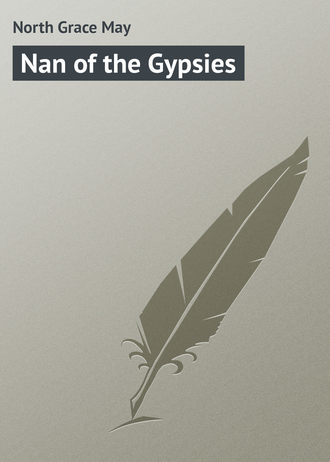 полная версия
полная версияNan of the Gypsies
Professor Bentz was amazed and delighted. “I knew she had talent,” he said to Mrs. Dorsey, the principal of the school, “but I did not know that she could play like that.”
When the recital was over, it was to Muriel that the medal of gold was awarded.
“Oh Nan, I ought not to take it. You have done it all!”
There was a happy light in the eyes of the gypsy girl as she stooped and kissed her little friend. “You played wonderfully dearie!” she said.
Just at that moment a maid appeared in the library door, where the performers had gathered. “Miss Muriel,” she called, “there is a gentleman here to see you.”
“It’s father!” the little girl cried with eyes aglow. “I do believe that he came for the recital.”
And she was right. Mr. Metcalf was standing in the small reception room and he caught his little daughter in his arms and held her close for a moment without speaking.
He said in a choking voice: “My dream is fulfilled. You play the harp, Muriel, as my sister did.”
Then he told her that he had long planned to visit her at the school and had timed that visit so that he might be present at the recital without her knowing it.
“I think I must have known it, somehow,” the happy little girl said, “for I was playing only for you.”
And Nan Barrington, who had done so much to help Muriel, felt that the winning of the love of her little “enemy” was far more to be desired than the winning of the medal of gold.
CHAPTER XXIII.
A JOYOUS INVITATION
A month had passed and the orchard back of the school was a bower of pink and white blooms, while oriole, robin and meadow lark made the fragrant sunlit air joyous with song.
Gypsy Nan stood at the open window of their room gazing out over the treetops to the highway, and how she yearned for her pony Binnie. She longed to gallop away, away – where, she cared little. Then she thought of the happy ride she and Robert Widdemere had taken three years before, and, sitting down on the window seat, with her chin resting on one hand, she fell to musing of those other days. Again she was a little girl, clad in a cherry red dress and seated in the boughs of the far-away pepper tree which stood on the edge of the Barrington estate in San Seritos. She recalled the sad, pale invalid boy in the wheeled chair, and she smiled as she remembered his surprise when a cluster of pepper berries had dropped on his listlessly folded hands. What splendid friends those two became the weeks that followed, and then there had been that last morning on the mountain top when he had promised that he would always be her friend, come what might. Little had they dreamed that years would pass, and that neither would know what had become of the other.
How she would like to see Robert Widdemere. He would be taller and broader, with a dignity of carriage which he surely would have acquired after three years’ training in a military academy. How good looking he had been that long ago Thanksgiving morning when he had worn the gypsy costume!
At this point Nan’s revery was interrupted by Phyllis, who fairly danced into the room. She held an open letter and she gaily exclaimed:
“Nan darling, you never could guess what you and I are going to do.”
“It must be a happy something, by the way you are shining.”
“Oh, it is the most exciting thing that ever happened in all my life,” the other girl exclaimed joyously as she sat on the window seat facing her friend. “It’s an invitation that came in this letter, and Mrs. Dorsey has granted us both permission to accept.”
Nan’s dark eyes were wide with wonder. “Am I invited to go somewhere?” she asked. “Please don’t keep me guessing about it any longer. Do tell me where.”
“Well, then, I’ll have to begin at the beginning. You have often heard me speak of my cousins the Dorchesters.” Nan nodded. “They have been in Florida all winter,” she continued, “but now they have returned and have opened up their city home and the tenth of May will be Peggy’s birthday and we are invited to her party. It will be on Saturday night, but Mrs. Dorsey said that we need not return to Pine Crest until the following day – and oh, I forgot to tell you! It’s a masquerade and we must begin at once to think what costumes we will wear. I have the sweetest May Queen dress! I might wear that with a wreath of apple blossoms in my hair.”
“Joy, that would just suit you, but pray what shall I wear?”
“Oh, Nan, do wear your red and gold gypsy dress. You look just beautiful in that. Say that you will to please me,” Phyllis pleaded.
“Very well; to please you and also to please myself. I would just love to have an excuse to wear that wonderful shawl that once long ago belonged to my beautiful mother.” There was always a wistful expression in the dark eyes when Nan spoke of the mother whom she had never known.
“Was your mother – ” Phyllis hesitated.
Nan turned clear eyes toward her friend. “Was she a gypsy, do you mean? Dearie, I don’t in the least mind talking about it. Ask me anything that you wish. The only part that I regret is that I cannot answer anything with real knowledge. I have always supposed that my mother was the one of my parents who was a gypsy. That is what I told Queen Luella, but afterwards, in thinking it over, I wondered if it might not have been my father, or perhaps they both belonged to the band of Queen Mizella, I was not to be told until I was eighteen.”
After a thoughtful moment Phyllis ventured: “Nan, would you feel very badly if you were to discover that you are not a real gypsy at all; that perhaps your mother for some reason had given you into the keeping of Manna Lou and had died before she returned to claim you? You might have been a Rumanian princess and the throne might have been threatened and it was necessary to hide you.”
Nan’s merry laughter pealed out. “Phyllis, you are trying to steal my thunder, making up exciting tales as you go along. Now you know, dearie, that I have won fame, if not fortune, by improvising impossible fiction, and I do not want to relinquish, even to you, the laurels I have won.”
Phyllis watching the glowing dark face asked another question. “What do the real Rumanians look like. I mean the ones that are not gypsies. Aren’t they very dark and beautiful just as you are?”
Nan sprang to her feet and made a sweeping curtsy as she exclaimed dramatically: – “Would that everyone had eyes like yours. But truly, dear,” the gypsy girl dropped back into her deep easy chair, “I know no more of the Rumanians than you do. Just what we have learned in our illustrated book on ‘Men and Manners of Many Lands.’”
“But you haven’t answered my question,” the fair girl persisted. “Would you be dissappointed if some day it should be discovered that you are white and – .” Again Nan laughingly interrupted, making an effort to look in the mirror without rising. “Goodness, am I black?” Then, before Phyllis could remonstrate, Nan continued; “I thought I was just a nice brown or – “ Her friend sprang up and kissed her lovingly, then perched on the arm of the chair, she exclaimed warmly: “You have the most velvety smooth olive complexion. Many American girls have one similar, but not nearly as nice, and now, since you do not want to answer my question, we will change the subject.”
Nan, nestled lovingly against her friend. “Indeed I shall answer your question. I would be very, very sorry if I were to suddenly learn that I am not at all a gypsy. I would feel – well as though I were a stranger to myself or as though my past was a dream from which I had been rudely awakened. I wouldn’t know how to begin to live as somebody quite different.” Then, as a bell rang and Phyllis arose, Nan concluded: “But we need have no fear of such a sudden transforming, for I know I am a gypsy. Manna Lou never told a lie and she said time and again that the only part of my story that she would or could tell me was that I am one of their own band.”
Impulsively Phyllis kissed her friend. “If being a gypsy is what makes you so adorable, I wish we had more of your band in our midst.”
Then after hastily tidying and washing in their very own wee lavatory, arm in arm the two girls went down to the dining hall again, chatting happily about the week-end treat that was in store for them.
CHAPTER XXIV.
NAN’S FIRST MASQUERADE
The home of the Dorchesters was brilliantly lighted and the little hostess Peggy, who represented a rose fairy, was exquisitely gowned in filmy pink. Her small black mask hung over her shoulder and she was arranging a huge basket of apple blossom sprays in the library when Phyllis, looking like a very lovely May Queen, entered the room.
Peggy whirled around and holding out both hands, she kissed her cousin impulsively as she exclaimed: “Oh, I’m so glad that you could come. It’s just ages since I saw you last, and ever so many things have happened. Tomorrow morning we’ll have a talkfast and gossip for hours, but do tell me who is the room-mate that you asked if you might bring. I just saw her a minute as you came in, but I thought that she was very beautiful, dark like a Spanish of French girl, isn’t she?” Then, without waiting for an answer, impetuous Peggy hurried on as a new thought presented itself.
“Phyllis you never could guess who is coming tonight. One of our boy cousins whom we haven’t seen in just ever so long, but there, I ought not to be calling him a boy, he’s so big and good-looking? His mother is staying with us and she talks about her wonderful son all of the time. She plans to have him make a most eligible marriage, but he doesn’t seem to care for girls at all. Oh, here comes your friend! Isn’t that gypsy costume fascinating?”
Nan Barrington was presented to the little hostess and to her mother, who appeared at that moment to assist in receiving, and then the guests began to arrive.
Phyllis and Nan retreated to a seat beneath a bank of palms and not far from the hidden musicians. They had on their masks and Nan, who had never before attended a real party of any kind, was interested in all that she saw. Suddenly she caught her friend’s hand as she said softly, “Phyllis, will you look at the young man who is just entering! Who do you suppose he is?”
“Why, he has on a gypsy costume! That’s rather strange, isn’t it? Wouldn’t it be amusing, Nan, if he should ask you to dance? There are to be no personal introductions, you know. Only close friends of Aunt Lucy’s and Peg’s are invited, and so, of course, that in itself is sufficient introduction.”
While Phyllis had been talking a youth dressed as a knight had approached and asked her to join the promenade with him, and so, for a moment Nan was left alone. She did not mind and she sat smiling as she thought how like a play it all was when suddenly she heard someone saying, “Lady Gypsy, will you promenade with me?”
Nan sprang to her feet and held out both hands impulsively:
“Robert!” she said. “I thought of you the moment that I saw that costume but it isn’t the one that you wore so long ago and I never dreamed that it could be you, but your voice – I’m not mistaken in it, am I?”
For answer the lad tore off his mask and looked down at the girl with an expression of radiant joy.
“Lady Red Bird,” the lad exclaimed as he led her back of the sheltering palms, “for three years I have tried and tried to find you. Did you think that I had broken the promise that I made to you high on the mountain? Indeed I have not, and I never will break it. Please remove your mask. I want to know what my sister-comrade looks like after all these years.”
“Robert, I wish to speak with you.” It was the voice of his mother calling softly from an open door near. The lad although deploring the interruption, was too courteous to not heed his mother’s request. Hurriedly he said: “I will be back directly. I have so much to tell you and so very, very much that I want to learn about you.” He was leading the gypsy girl back to her seat beneath the palm.
When he was gone Nan suddenly remembered that in her surprise and joy at finding her old-time comrade she had completely forgotten the promise that she had made his mother three years before on Thanksgiving day.
Mrs. Widdemere had then forbidden Robert to ever again speak to the gypsy girl, but before the indignant lad had time to reply, it was Nan who had said: “You need not be troubled, Mrs. Widdemere, for I shall never again speak to one of your kind.”
Unconsciously she had broken that promise many times, for was not her dearly loved room-mate this woman’s niece? Too, even now she had been speaking to her son. Rising, she decided that she must go away somewhere and think what would be the honorable thing for her to do, Just then she saw Phyllis approaching with her partner and, hurrying toward them, she said, “Phyllis, may I speak with you alone for a moment?”
Her friend, excusing herself, led the way into a small reception room and closed the door. “What is it, Nan? You look as though something very unusual had happened.”
The gypsy girl’s cheeks were burning and it was plainly evident that she was much excited. “Phyllis,” she said hurriedly, “don’t ask me to explain now. Please help me to get away at once. Can’t I call a taxi and go to Aunt Dahlia? Something has happened and I will tell you all about it to-morrow. Don’t worry dear, but I must go.”
Phyllis believing that her dearest friend was about to be seriously ill, hastened to comply with her wishes. First she explained this fear to Peggy’s mother, who at once called their chauffeur and directed him to take Nan to the Barrington residence.
It was not late and Miss Barrington and her younger sister. Miss Dahlia, were seated in the library reading when the girl entered. They were indeed surprised, for Nan had called on them not two hours before when she had first arrived in town.
“Dearie,” Miss Dahlia exclaimed, rising and going toward the girl with outstretched hands “what is it? Are you ill?”
“No, not ill, but troubled in spirit,” Nan said with a forlorn little laugh. Then she sat on a stool near the two old ladies and told all that had happened.
Miss Ursula drew herself up proudly as she said, “Sister Dahlia, why did you not tell me this before? I did not know that Anne had been so humiliated. I shall certainly inform Mrs. Widdemere that a girl whom the Barringtons are proud to adopt as their own is quite worthy to be her son’s companion. Anne, if you wish I will return with you to the party. Mrs. Dorchester and I were school-mates long ago.”
“No, thank you,” Nan replied rather wistfully, “I would rather not go back.”
Meanwhile Robert, having left his mother, who merely wished to introduce him to an heiress, returned to find the seat beneath the palms unoccupied. Nan was gone and though he stood with folded arms and watched the passing dancers, he did not see her. At last he sought the little hostess and inquired what had become of the guest disguised as a gypsy.
CHAPTER XXV.
NAN’S DECISION
Miss Barrington, who had learned to love Nan as dearly as had her sister, Miss Dahlia, looked admiringly at the beautiful girl, who, having removed her gypsy costume, was clad in a clinging simple white voile.
“Anne,” she said, “will you play for us? The piano has not been touched in many a day.”
And so Nan, always glad to please these two, played and sang the selections chosen by the elderly ladies.
Suddenly the telephone rang and a maid appeared. “Miss Barrington,” she said. Nan ceased playing, and, to her surprise, she heard Miss Ursula replying to someone over the wire, “Yes indeed, you may come. We shall be glad to have you.”
For some unaccountable reason Nan’s heart began to beat rapidly. Could it be Robert who was coming? She wondered as she resumed her playing, but her fingers went at random and then, before it seemed possible, the door bell rang and a moment later Robert in his military uniform, entered the room.
He was gladly welcomed by the two old ladies who had known him since he wore knickerbockers and then when Nan went forward and held out her hand as she said in her frank friendly way, “Robert, forgive me for disappearing, but I suddenly remembered that I had promised your mother that I would never again speak to one of her kind, and I do sincerely wish to keep my promises.”
“But, Miss Barrington,” the lad appealed to the elderly woman, “should one keep a hastily made promise when there is no justice in it? I am sure that my father would approve of my friendship with Nan, and though I regret my mother’s attitude, I do not think that I should be influenced by it. If you and Miss Dahlia will grant me permission to be Nan’s comrade once more, I will promise to care for her as I would wish another to care for a sister of mine.”
They were seated about the wide hearth for the evenings were cool.
“Robert Widdemere,” Miss Ursula said, “if Anne wishes your friendship, we will welcome you into our home whenever you desire to come. We wish Anne to remain at the Pine Crest seminary until June. We are then going to our cottage on the coast of Maine until October, when we will return to San Seritos for the winter.”
The lad’s eyes were glowing. “How I would like to go back there,” he said, then, turning to the girl, he added, laughingly, “I suppose Lady Red Bird is too grown now to climb the pepper tree.”
“I suppose so,” Nan replied merrily. “That is one of the penalties of being civilized.”
Soon the lad rose reluctantly. “I promised Cousin Peggy that I would return for the supper dance at ten o’clock,” he said, “and to keep that promise I must leave at once. But, Nan, you have not yet told me that you care to have my friendship.”
The girl looked thoughtfully into the fire a moment and then replied slowly, “Robert Widdemere, I do want your friendship, but I would be happier if I might have it with your mother’s consent.”
“Then you shall,” the boy replied.
In the meanwhile Peggy had sought Phyllis. “I don’t in the least understand what is happening,” she said. “First your friend, disguised as a gypsy, leaves in a panic, then Cousin Robert insists on knowing where she has gone and follows her, and when his mother heard about it, she became so angry that she went at once to her room and bade us tell Robert to come to her the moment he returns. What can it all mean?”
“It’s just as much a mystery to me, Peg,” Phyllis said. “But there comes Robert now. Perhaps he will explain.”
********The interview that Robert Widdemere had with his mother on his return from the Barrington home was not a pleasant one for either of them but in the end Robert had said firmly but gently, “I feel sure that my father would approve of my friendship with Nan and, moreover, next summer I will be 21 and I shall consider myself old enough then to choose my own companions. My dad must have expected me to possess good judgment in some degree or his request would not have been that I assume the reins of his business on my 21st birthday.” Then, going to the indignant woman, he put his arm about her as he said lovingly, “Mother, dear, I want you to tell me that you are willing that I may be Nan Barrington’s friend.”
“It is a great disappointment,” Mrs. Widdemere said, “but, since you are soon to be financially independent of me, I suppose that I might as well give my consent. However, do not expect me to receive that gypsy girl into my home as an equal, for I shall not.”
********The next morning Phyllis and her cousin Robert visited the Barrington home and an hour later the lad accompanied the girls to the station where they were to take the train for Pine Crest.
Robert had told Nan that he had won his mother’s consent to their friendship but he did not tell how reluctantly that consent had been given.
The next day the lad returned to the Military Academy where in another month he would complete his training, but each week he and Nan exchanged letters telling of the simple though pleasant experiences of their school life.
Nan and Phyllis were to graduate in June and they were happily busy from dawn till dark. It had been the custom for many years at the Pine Crest Seminary for the pupils to make their own graduating dresses by hand. These were to be of dainty white organdie and the two girls, with their classmates, spent many pleasant hours sewing in one room and another. Tongues flew as fast as the needles while each young seamstress told what she hoped the summer and even the future would hold for her.
Nan was often thoughtfully silent these last days of school.
One twilight Phyllis found her standing alone at their open window watching the early stars come out.
“What are you thinking, dear?” she asked.
“I was wondering about my own mother,” Nan replied. “Next week I will be eighteen and then it was that Manna Lou planned telling me who I am, I never could understand why she did not tell me before, but she said that she had promised, and now, that I might know, I am too far away.”
“Perhaps your mother was a sister of Manna Lou,” her friend suggested.
“Perhaps, but come dear,” Nan added in a brighter tone, “we are due even now at French Conversation.”
Nan did not speak again of the mystery of her birth, but she often wondered about it as her eighteenth birthday neared and she longed to know more of her own mother, who must have loved her so dearly.
CHAPTER XXVI.
NAN’S EIGHTEENTH BIRTHDAY
Nan Barrington’s eighteenth birthday dawned gloriously and as soon as they were dressed Phyllis disappeared to return a moment later with an armful of wonderful red roses.
“It’s a happy birthday greeting from a cousin of mine,” she laughingly told the surprised girl.
“Oh, are they from Peggy Dorchester?” Nan exclaimed as she took them.
Her friend’s eyes twinkled. “No,” she said “this cousin’s name is not Peg. Guess again.”
Nan’s dark eyes were glowing above the beautiful bouquet. “Oh, then they are from Robert. How kind of him to remember my birthday.”
Lovingly she arranged the fragrant roses in a large green jar and, selecting a bud, she placed it in her friend’s belt and fastened another at her own. Then slipping her arm about Phyllis and chatting happily, they went down the broad front stairway to the refectory.
When they were returning, half an hour later, Mrs. Dorsey was in the corridor and she smiled lovingly in response to the girls’ morning greeting.
“Anne,” she said, “this is your eighteenth birthday, is it not? Can you spare a few moments for a visit with me?”
Nan’s face brightened. “Oh yes, indeed, Mrs. Dorsey,” she replied. Phyllis went on to the library and the gypsy girl entered the office with the kindly principal.
“Be seated, dear,” Mrs. Dorsey said. “I have long planned having this visit with you and now that you are soon to leave us, I must no longer delay. Miss Dahlia Barrington, who, as you know, was a schoolmate of mine, told me how you chanced to come into their lives. Miss Dahlia is very proud of you and Miss Ursula is also. I, too, am proud of your splendid accomplishments, Anne. I feel that you have made much progress in the three years that you have been with us and I deeply regret that you are about to graduate. I know nothing of your plans for the future but, if the time ever comes when you wish to be self-supporting, I will be glad to give you a position as a teacher of languages and music for the younger pupils.”
“Oh, Mrs. Dorsey!” Nan exclaimed gratefully, “how very kind of you to make me such an offer. If Miss Dahlia will permit me to do so, I will gladly start teaching the little ones at the beginning of the fall term. I have hoped that I might find some way to repay my benefactors, for, of course, I have been a great expense to them.”
Mrs. Dorsey smiled and, as she stood, Nan also arose. “I shall indeed be glad to have you with us, Anne,” the kind woman said as she kissed the girl on each cheek, then she added brightly. “Happy birthday, dear, and may each coming year find you as unspoiled and lovable as you are today.”
Nan flushed happily at this praise and then she sought Phyllis to tell her the wonderful news.
“You, a teacher!” her friend cried in dismay. “Oh Nan, I did so want you to go to college with me next year. Your aunts are very rich, I am sure, and I just know that they will not think of permitting you to earn your own living.”
Nan stood looking thoughtfully out of the open library window. “I would rather be independent,” she declared. Then, noting her friend’s dismal expression, she laughingly caught her hands as she said, “Well, we won’t decide the matter, now. I’ll talk it over with Aunt Dahlia when she comes.”





